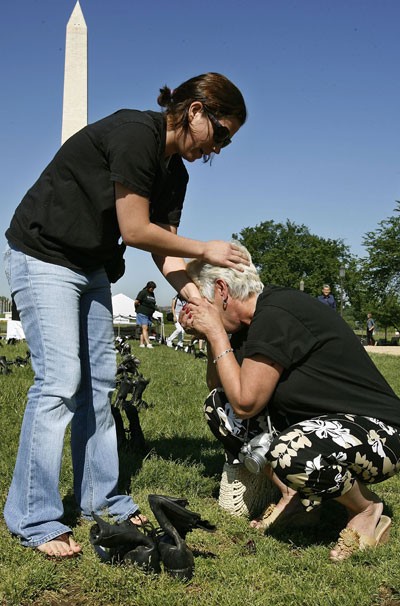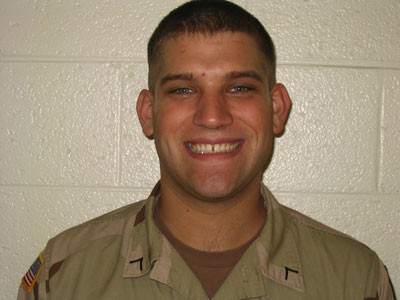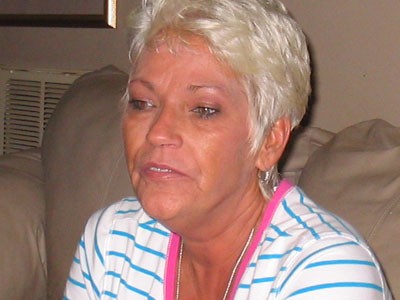A rainstorm is blowing in by the time Summer Lipford, deep in conversation, notices the setting sun and apologizes. "It's time for my nightly ritual," says the Statesville woman as she rises from her couch, cigarette in hand.

- Chip Somodevilla
- Laurie Sirko (L) comforts her mother Summer Lipford, next to a pair of military boots bearing the name of her son, U.S. Army Pfc. Steven Sirko, during the "Eyes Wide Open: The Human cost of War" exhibition on the National Mall, May 12, 2006, in Washington, D.C.
Moments later, we hop into her Volkswagen Beetle and head to Oakwood Cemetery, just a little more than one mile away. Darkness has almost set in as the car nears one of many rows of headstones. Plodding across the moist grass, she approaches her son's grave. She whispers softly to the young, fresh-faced man in the picture set within the granite.
Then, just as she and her family have done each night since her son Steven was buried, she lights a candle. More murmurs pass her lips, she wipes her face, and heads back to her car to return to an empty house.
Nineteen months have passed since Pfc. Steven Frederick Sirko was found lying facedown by his bed at Camp Normandy in Muqdadiyah, Iraq, after failing to report for duty one morning. No sign of trauma marked the 20-year-old man's body. The Department of Defense press release would say he had died of "non-combat related injuries."
Nineteen months.
In that time, Army officials would acknowledge that several soldiers' deaths -- most famously NFL standout Pat Tillman -- had been misreported, and they would reopen investigations of other casualties. Support for the war would erode. Democrats would take control of Congress for the first time in 12 years.
Out of public view, the lives of soldiers' families would change immeasurably. Many could take solace that their loved ones died for a cause they supported. But many other Gold Star relatives, like Summer Lipford, would struggle to make sense of the death of sons, daughters, husbands and wives. Lipford's days and nights would be consumed by grief.
Her life would become a swirl of e-mails, phone calls and urgent pleas as she turned into an anti-war activist. Trying to exorcise her pain by sharing it with anyone willing to listen, she'd hope somehow to find answers to her son's death. And, she hoped, fewer mothers would learn their children had died in the Iraqi desert.
Nineteen months later, the U.S. casualty count in Iraq has topped 2,800, and answers to her son's death continue to elude Lipford. Today she still wonders, "Why was my perfectly healthy 20-year-old son found dead in his barracks at 8 a.m.? What -- or who -- is responsible?"
Steven Sirko had served in Iraq for only three months. A medic assigned to the 1st Battalion, 30th Infantry Regiment, 3rd Brigade, 3rd Infantry Division from Fort Benning, Ga., Steven worked 12- to 16-hour shifts at an emergency aid station, helping stabilize injured Americans and Iraqis until they could get to a hospital. Other times, he was assigned to an infantry unit as a medic.
Though Lipford says that he had been scared to go to Iraq, he told her and other family members that he was making a difference by saving lives. "He loved being a medic," says his sister, 23-year-old Laura Sirko of Statesville.
Lipford says she never had questions about his mental state, though Steven had mentioned the last time they spoke that other soldiers were having emotional problems and didn't feel they could get help. He brushed off Lipford's urging that he flee to Canada when he returned to the U.S. on leave.
"Steven was actually able to feel like he was able to make a difference," she says. "He took very seriously what he did."
The experience was far from the life he had known in the States, where Steven, the youngest of four siblings, was known as a jokester with "bags of personality," his mother says. A high school football player and wrestler, he had lived in Statesville with his mother and in Portage, Ind., with father Fred Sirko. Steven was exceptionally close to his mom and delighted in his niece and nephew. "Everyone would say that they were the closest [to Steven]," says Laura Sirko.
As high school graduation neared, Steven wasn't sure what he wanted to do with his life. He began talking about joining the military in 2001, and Lipford and her husband -- Steven's stepfather -- initially embraced the idea. The couple believed the teenager could benefit from the structure and direction the military has offered many a teenager before. "I felt that Steven going to college right out of high school was not a good idea because he was so young and immature," she says. "The Army was a good life."
But it soon became clear that the kind of Army living in store for Steven was not the variety the Lipfords had in mind. Tensions were building between Iraq and the U.S. after 9/11, though the Lipfords wondered why. What, they thought, did the Iraqi dictator have to do with al Qaeda or the Saudi terrorists who flew planes into buildings? "I'll bet we go to war," her husband said. "You just wait and see."
So they tried to dissuade Steven. They hoped that testing positive for pot would keep Steven home; it didn't. One recruiter, Lipford claims, even told Steven "the Iraq thing would be over before you even finish boot camp."

- Courtesy of Summer Lipford
- Pfc. Steven Sirko
Steven wouldn't budge. He enlisted Oct. 17, 2002, and only informed the family afterward. In the Army he met Spc. Virginia Downs and married her, just one day shy of his three-year anniversary in the Army. Lipford and her husband weren't in favor of Steven getting married. "He was 20 years old -- far too young," she says.
Just three months later, the couple headed to Iraq. The whole family -- siblings and parents -- drove to Fort Benning to see Steven one last time. Lipford still remembers that final hug. As they were leaving, Lipford made her husband stop the car to hold him one more time.
"I ran back, and I grabbed him ... I held him and I closed my eyes. And I asked God not to let me forget what that felt like," she says. "I held him as tight as I could, and he said, 'Mom, you've got to go, you've got to go.' I said, 'I know honey. I know but I love you so much.' And he was crying."
She got back in car and told her husband and daughter Lori that Steven was never coming home. Recalling this, her voice trails off, "Why didn't I ..."
The days after Virginia Sirko's phone call were a blur. Steven arrived at Charlotte Douglas International Airport at about 4:30 p.m. on April 21, 2005. The plane sat on the tarmac until after dark, when airline personnel removed Steven's body from the cargo hold.
"There's a lot that I don't remember, for days," says Lipford, sitting in the living room of her home in a historic section of Statesville. She'd "almost" quit smoking before Steven died; now she lights one Marlboro Light after another.
Ten days after the funeral in Statesville, an agent from the U.S. Army Criminal Investigation Division sat on Lipford's couch and told her -- though the autopsy wasn't yet complete -- that Steven had died from an apparently self-inflicted drug overdose. That wasn't possible, she said -- Steven didn't use drugs.
She then listened as the agent said medics had killed themselves with overdoses before -- not because they wanted to die but because they wanted to relieve the pain of what they had witnessed. "And they said, 'Mrs. Lipford, this is something that you're going to have to live with.' And I said, 'This is something that I will never accept,'" she recalls.
Later, when she finally obtained a copy of preliminary autopsy results, she felt vindicated: No drugs were detected in Steven's body. Steven had not died of natural causes, and suicide had been ruled out.
What, then, happened? The only drug found near Steven (one report indicated investigators found it in his room; another indicated it was not) was vecuronium. The neuromuscular blocker is a powerful paralytic that has no recreational value, says Maryann Oertel, a pharmacist in the drug information center at University of North Carolina Hospitals.
A medic would have known many drugs that offered a much easier death -- vecuronium has no sedative properties and would cause asphyxiation while its recipient was totally conscious. "Basically what occurs is you have respiratory paralysis ... which leads to cardiovascular collapse and, in the end, respiratory arrest," said a poison information provider at the Carolinas Poison Center.
Steven's widow told Lipford that toxicology reports wouldn't detect vecuronium. The military, however, did devise a screening and determined that yes, Steven did have the drug in his body when he died. "He died a very painful death," Lipford says. "He was completely conscious."
The next question, then, was why? That has never been answered. Lipford has struggled for answers. Her son's widow, however, has tried to move on. According to Lipford, Virginia Sirko quit talking to the family after Lipford told her that the Army had developed a way to screen for vecuronium. Sirko has no listed phone number, and attempts to reach her through relatives were unsuccessful. She refused a letter sent to her Elizabethtown, Ky., address. It was returned unopened.
The Army's investigation ultimately ended with the finding that Steven died of accidental poisoning. Summer Lipford has her own theory: She believes that Steven asked someone for medicine to help with pain -- say, from an old rotator cuff injury -- and instead the person intentionally gave Steven vecuronium. Lipford's now turning to Sen. John Kerry, D-Massachusetts, and Sen. Evan Bayh, D-Indiana, whom she says have expressed interest in getting her son's case reopened.
Meanwhile, Lipford focuses every day on her son's death. She has quit her job. Family gatherings are difficult. "It's totally devastated us," says Laura Sirko, Steven's sister. Sirko had a breakdown after her brother died and had to leave her job. "He was kind of the one who tied the family together."
Lipford's husband, to whom she has been married more than two decades, has left her. The two still talk, however. "I can't lay blame on him," she says. "But you know, he can't deal anymore with me not being able to deal, and I can't deal with the loss of my son," she says.
Most coverage of slain soldiers' families has focused on their degree of support for the war: What do these Gold Star families believe about the war? Do they support Cindy Sheehan, the prominent "peace mom" and polarizing figure whose protests outside President Bush's Texas ranch, appearance with Venezuelan President Hugo Chavez and assorted remarks have brought her international acclaim and criticism?
But scratch away the politics, and what you have is a genuinely grieving mother. Kathleen Gilbert, an associate professor of applied health science at Indiana University and grief expert, says parents who lose a child often feel shunned by other people who are deeply afraid of the notion that children die before parents. Pain is only compounded when a child dies in a controversial military action. With such disenfranchised grief, Gilbert says, "Either your grief isn't seen as appropriate or you're not seen as grieving appropriately. There's a stigma with disenfranchised grief. Always."

- Karen Shugart
- Summer Lipford talks about her son's death to anyone she can, in hopes that someone will help her find the truth about his death.
Lipford smokes three packs a day and often sleeps only a few hours a night. She's seen a therapist, tried antidepressants and Compassionate Friends, a support group for bereaved parents. Nothing seemed to do much good. Talking about Steven's death, she says, hurts but comforts her. "I don't know where to put all my sadness," she says. "I just miss him. It's incredible how much I miss him. He had bags of personality and was so smart."
Lipford's activism hasn't brought her much mainstream North Carolina media attention outside Iredell County, though she was on WFAE 90.7's "Charlotte Talks" radio show on Nov. 9. She networks with other Gold Star parents through organizations including Gold Star Families Speak Out. Every day, she is on the phone and on the Internet, seeking help for her cause. (One call to a military attaché resulted in a knock on the door from the U.S. Secret Service three hours later. Lipford admits to telling the attaché, "I say, you know what they need to do? They need to take Bush, Rumsfeld, Cheney -- line 'em up and let one round take them all.")
Diane Frederick, a local activist with MoveOn.org, recalls meeting Lipford the first time at a peace vigil. "She could barely speak," Frederick says. "She maybe got a half sentence out and she burst into tears. She was distraught and tried to speak a little bit, but she was so emotional and torn up. It was really hard to watch."
It's not as if speaking out is foreign to her. Summer Kay Lipford's mom was active in union organizing; both parents were very involved in children's charities. The couple could not be caricatured as hating America. "I grew up loving this country," Lipford says of her Indiana childhood. "It was almost a religion."
Lipford believes most Americans have too much emotional distance from the war; that Iraq is merely a headline on the news, proffered after stories about the latest political scandal or celebrity tidbit. "They don't realize the struggles that are going on there." She says. "The general person that I meet on the street will tell me, 'Oh, I'm so sorry your son died.' But they'd be sorry if he had been in a car wreck or a shooting or if he fell off a ladder. It's not, 'Oh my God, another soldier has died because of lies, deceit and deception.'"
Two elected officials, Senator Bayh of Indiana and Rep. Virginia Foxx, a North Carolina Republican, did honor Steven on the floor of Congress. "While we struggle to bear our sorrow over this loss, we can also take pride in the example he set, bravely fighting to make the world a safer place," Bayh said April 25, 2005, according to the Congressional Record. About one week later, Foxx said this: "We owe this brave soldier and his family a tremendous debt of gratitude for his selfless service and sacrifice. Our nation could not maintain its freedom and security without heroes like Steven who make the ultimate sacrifice."
But Lipford has found politicians to have a woeful lack of sincere gratitude to slain soldiers and their families. No local elected official, she says, came to her son's funeral even though Steven's death was front-page news in the Statesville daily newspaper and the funeral home was within sight of City Hall. And only one of the dozen or so senators she contacted would meet with her -- Sen. John Kerry. The Massachusetts Democrat hugged her and said he was sorry her son had died, she says.

- Jim Ruymen
- Sen. John Kerry has expressed interest in helping get the case surrounding Pfc. Sirko's death reopened.
Others -- Democrat and Republican -- sent aides or declined to meet with someone who wasn't a constituent, she says. "My answer to that was, my son didn't die for North Carolina. My son died in the U.S. Army. Were they or were they not U.S. senators?" she recalls.
Sen. Elizabeth Dole, she says, did send a letter 10 weeks after Steven's death that said she was respecting Lipford's privacy. "My son died in a very public war. He went to war during the day, yet his body wasn't allowed to be returned home until after dark," she says. "Do you not think I wanted the bands and the roads closed and his body brought home with honor?!"
But when she requested meetings with her senators, aides for Dole and Sen. Richard Burr met with her at once to save time. "I found this to be extremely insulting ... What about my time? What about my time at the cemetery?" she asks, starting to cry. "What about the time I'm not going to have with my son? Doesn't that count for anything?
"I'm the mother of a dead soldier," she says. "Give me the respect of meeting with me."
J. Shep Jeffreys, author of Helping Grieving People: When Tears Are Not Enough, says grieving people often struggle to have their loss acknowledged. "I think the primary way that death of someone in the military differs from death of nonmilitary children has to do with how we make meaning of the death," he adds. "When a loved one dies in a situation where it fits your assumptions about the world, then there's less problematic grieving than if it's in great dissonance with your assumptions about what's right or what's wrong ... If a military parent has been or becomes opposed to a military action, it creates a high risk for problematic grieving."
In such context, parents struggle for meaning. Says Lipford, "This government did not look at my son as a hero but looked at him as just an expendable piece of property. And that's exactly the way he was treated, like a pair of old shoes. When he was no longer able to give, he was just tossed home."
Politicized death, Gilbert says, complicates the grieving process. "You're not just grieving over the loss of your son; you're grieving over the loss of your belief in your country. Maybe you're grieving over the sense of loss of control over your life. Every single loss complicates your grief and makes it longer and more involved."
As she drives back from the cemetery, Lipford runs through a litany of ways she feels her son was disrespected. It turns to night and the rain pours, and Lipford shows no desire to get out of her car after she's pulled it back behind her house.
"The world lost a great human being when they lost Steven," she says at one point before heading back into her house, alone. "I ask myself every morning, how to get through today. How am I going to live through today without Steven? And I just want accountability for that."